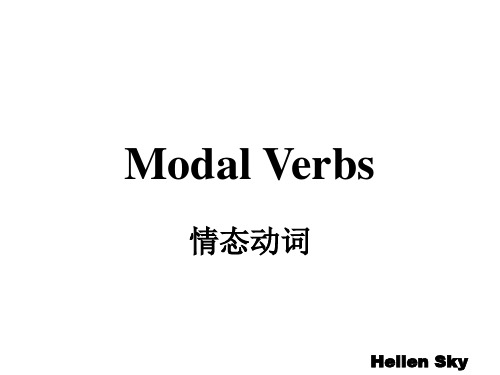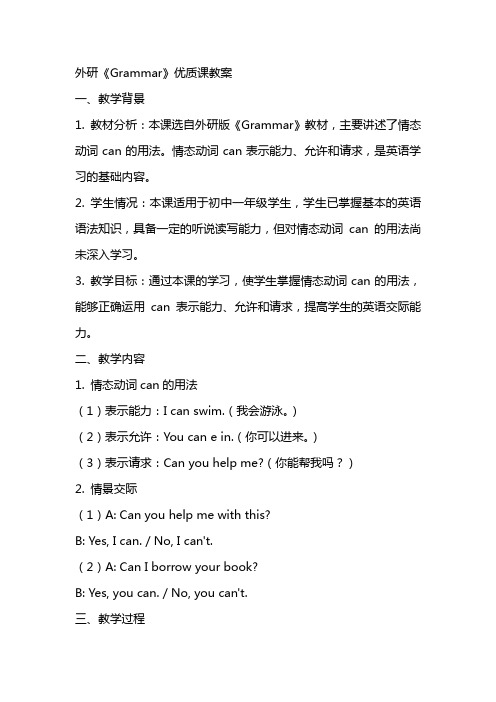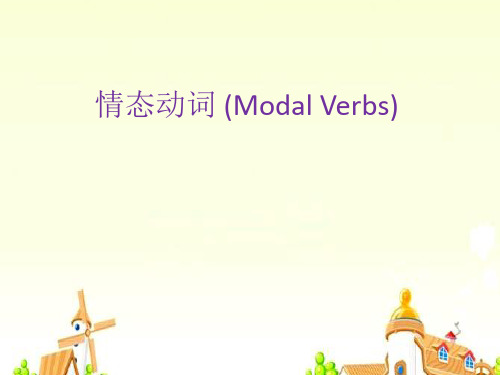Grammar情态动词
grammar 情态动词

1.--Excuse me, but I want to use your computer to type a report. A have my computer if you don’t take --You ____ care of it. A. shan’t B. might not C. needn’t D. shouldn’t 2. ---When can I come for the photos ? I need them tomorrow afternoon. B ---They _____be ready by 12 : 00 . A. can B. should C. might D. need 3. With so much work on hand, you ____to D see the game last night. A. mustn’t go B. could have gone C. shouldn’t go D. shouldn’t have gone
Modal verbs I
情态动词的语法特征
1. 情态动词有一定的意义,只表示期待或估计某事的 发生,不能表示正在发生或已经发生的事情。 2. 没有人称和数的变化,即情态动词第三人称单数不 加-s。 3. 不能独立使用,它和后面的动词构成谓语。 4. 情态动词 除ought 和have 外,后面只能接不带 to 的不定式。 5. 情态动词没有非谓语形式,即没有不定式,分词, 等形式。
He might be doing his homework now. (可能性更小)
2.might/may have done,表示对过去发生的动作进行 可能性推测, 他可能去医务室了。 He may have gone to the clinic. 他可能已经从报纸上知道这个消息了。 He might have read about the news in the newspaper.
Unit5SectionⅢGrammar——情态动词和过去将来时

英语课件
栏栏目目导导航航
(1)①can 表示可能性时,指的是理论上的可能,它通常不用来表 示某事实际发生的可能性或真实性。如:
Accidents can happen.Anybody can make mistakes. 如果我们要表达某事发生的实际可能性,要用 may,could 或 might 等。
You should have told her about it the day before yesterday. It's wonderful that you should have achieved so much in these years. “情态动词+have+过去分词”是很重要的一种句型,除 should 外,may,might,must,couldn't,needn't,ought to 等都可以用于这 一句型,但要注意使用不同的情态动词句子的意思就有所不同。
英语课件
栏栏目目导导航航
(6)should 除表示必要或义务外,还可表示推测或可能。如: The American friends should be here now. “should/ought to+have+过去分词”既可表示本该做而事实上 没有做的事,也可以表示惊讶、责备、赞叹等情绪。如:
英语课件
栏栏目目导导航航
(7)ought to 与 should 意思接近,大多数情况下二者可以互换,但 是 should 谈的是自己的主观看法,ought to 则更多反映客观情况,在 谈到法律、义务和规定时使用。如:
We should/ought to help each other and learn from each other in our work.
人教版高一英语必修三 unit1 grammar 情态动词课件

e.g: He must/can/may/might know the answer to the question.
表推测的 三种句式
2. 否定句:can't/couldn't (不可能),may not/might not (可能不)
e.g: It can't/ couldn't be the Miss Lin. She has gone to America.
The boy can’t be Jim. He’s can可能 much taller.
can’t不可能 这个男孩不可能是吉姆。他 要高很多。
2. 常见情态动词
原形
用法
含义
例句
(过去式)
may
(might)
Tony may know the way.
表示可能性(可 与maybe互换)
可能
=Maybe Tony knows the way.
2. 常见情态动词
原形
用法
(过去式)
表示能力(= be able to)
含义
例句
能;会
Tom can swim. =Tom is able to swim.
汤姆会游泳。
can
(could)
(疑问句中)表示 请求
可以 Could you give us a hand?
你可以帮我们一下吗?
(否定句、疑问 句中)表示可能 性
• can 不肯, may 不问,must 不否问
注释: can表示推测通常不用于肯定句 may表示推测通常不用于疑问句 must表示推测通常不用于否定句和疑问句
肯定猜测的语气强弱:must>can> could>may>might
外研《Grammar》课教案

外研《Grammar》优质课教案一、教学背景1. 教材分析:本课选自外研版《Grammar》教材,主要讲述了情态动词can的用法。
情态动词can表示能力、允许和请求,是英语学习的基础内容。
2. 学生情况:本课适用于初中一年级学生,学生已掌握基本的英语语法知识,具备一定的听说读写能力,但对情态动词can的用法尚未深入学习。
3. 教学目标:通过本课的学习,使学生掌握情态动词can的用法,能够正确运用can表示能力、允许和请求,提高学生的英语交际能力。
二、教学内容1. 情态动词can的用法(1)表示能力:I can swim.(我会游泳。
)(2)表示允许:You can e in.(你可以进来。
)(3)表示请求:Can you help me?(你能帮我吗?)2. 情景交际(1)A: Can you help me with this?B: Yes, I can. / No, I can't.(2)A: Can I borrow your book?B: Yes, you can. / No, you can't.三、教学过程1. 导入:教师通过提问引导学生思考生活中可以用到情态动词can 的场景,激发学生学习兴趣。
2. 新课呈现:教师通过图片和例句展示情态动词can的用法,引导学生理解并模仿。
3. 课堂活动:教师组织学生进行小组活动,运用情态动词can进行情景交际,提高学生的实际应用能力。
4. 巩固练习:教师设计练习题,让学生运用情态动词can进行句子编写,检查学生掌握情况。
5. 课堂小结:教师总结本节课所学内容,强调情态动词can的用法和情景交际的重要性。
四、作业布置1. 抄写情态动词can的用法例句,每人至少5个。
2. 运用情态动词can编写一个短对话,描述自己或朋友的能力、允许和请求。
五、教学反思教师在课后对本节课的教学进行反思,分析学生的学习情况,针对存在的问题调整教学策略,为下一节课的教学做好准备。
Book 3 Unit 1 Grammar 情态动词 (一)

Book 3 Unit 1 Grammar 情态动词情态动词can,may,must,should,shall,will的用法比较情态动词有一定的含义,表达某种感情和说话的口气,不可以单独作谓语动词。
所以情态动词没有人称和数的变化,后面跟的动词需用原形,否定式构成是在情态动词后面加"not"。
个别情态动词有现在式和过去式两种形式, 过去式用来表达更加客气, 委婉的语气, 时态性不强, 可用于过去,现在或将来。
一.can / could 与be able to的用法比较1.can “能够,会”,过去式为could,表示能力,与be able to同义。
但be able to有各种时态,还可以表示成功地做了某事。
在否定句中can,could和be able to无区别。
He can speak English. 他会说英语。
He could speak English at the age of six. 他六岁就会说英语了。
I can’t / I will not be able to come this afternoon. 今天下午我来不了。
The fire spread quickly, but they were able to get out.火势蔓延得很快,但他们都成功地逃出来了。
2.can表示可能,怀疑,不相信或惊异的态度。
而could既可以表示过去也可以表示现在的“可能”,其可能性比can小。
Accident can happen any time. 事故随时都会发生。
This cannot be done by him. 这决不可能是他干的。
It could be true. 这也许是真的。
3.can / could 表示允许,could语气更委婉。
在回答对方提问时要用can,不用could。
-Could / Can I ask you a question?-Yes, of course you can.4.can / could + have done的否定式或疑问式表示对过去发生事情的不肯定或怀疑。
grammar(Modal Verbs)

8. Harvest and Thanksgiving festivals can be very happy events. 收获节和感恩节是非常喜庆的节日。 9. Some people might win awards for their farm produce, like the biggest watermelon or the most handsome rooster. 有些人可能因为他们的农产品(参加评选)而获奖, 比如 最大的西瓜或最帅的公鸡。 10. These carnivals might include parades, dancing in the streets day and night, loud music and colorful clothing of all kinds. 狂欢节也许包括街头游行、昼夜跳舞、鼓噪的音乐和各种 艳丽的盛装。
(2)在回答以must引导的问句时, 若是否定答复, 不用 mustn’t, 而用needn’t 或don’t have to, 因为mustn’t表示禁 止, 意思是“绝不能”“一定不要”, 而没有“不必”的意 思。例如: —Must we hand in our exercises today? 我们今天必须交作业吗? —Yes, you must. 是的, 必须交。 —No, you needn’t/don’t have to. 不, 没必要。 3)用于否定句, 表示禁止 Smoking must not be allowed in the office. 严禁在办公室吸烟。 You mustn’t talk to girls like that. 你绝不能那样对女孩子说话。
M11 Grammar 情态动词may might的用法

情态动词 一、什么是情态动词 表示说话人对有关行为或事物的态 度和看法。 情态动词 + 动词原形
情态动词 二、情态动词 may 和 might 的用法 might是may 的过去式,但在表示“可能” 这一含 义上,没有时间上的区别。 might比may 语气更婉转。可能性:might < may 结构:may/might + 动词原形 否定:may/might + not + 动词原形
(一)may和might都表示可能发生的事情。用于陈述句中
情态动词 ① 明天可能要下雨。 It may rain tomorrow.
② You may many questions to ask when you look
at the sky. 当你面对天空,你可能有许多问题要问。 ③ 到了2月,天气可能会暖和起来。 It may be warm in February. ④ 将来某一天,我可能去英国。 I may go to England one day.
情态动词 (二)may/might和表示可能的副词maybe, possibly, probably, possible 转化 Your cousin may/ might come tomorrow. I’ll probably + v. It’s possible to do sth.
情态动词 三、may 的其他用法 may 还用来表示“允许”或“请求”,用来询 问或说明一件事可不可以。 May I come in? May I open the door? May / Can/ Could/ Might I …?
人教版必修三Uint2Grammar情态动词分类

A
see you now. He is busy.
(2011 四川,20) The police still haven’t found the lost child, but they’re doing all they A . A. can B. may C. must D. should
三、表必要性 must: 一定,必须 have to: 不得不
二、表能力 can:表示现在的能力 could:表示过去的能力 be able to will be able to: 将来的能力 was/were able to:过去有能力并且成功地做了某事
技巧:这三个词不易混淆,所以做此类题时,一般通过翻译就能选出 答案。但是要注意题目的时态。 e.g. (2010 全国 II, 17) I’m afraid Mr. Harding A. can’t B. mustn’t C. shouldn’t D. needn’t
技巧:做到情态动词表示推测的题,一定要把题目读完,根据题目所 提供的信息判断填空部分所需要的语气。
e.g. He must be the wanted man, for he’s exactly like this picture. (因为他和照片很像, 能够判断出语气 是很肯定的) (2011 北京, 24)—I don’t really like James. Why did you invite him? —Don’t worry. He come. He said he wasn’t certain what his plans were. A. must not B. need not C. would not D. might not
四、表请求、建议、命令、允许、禁止 1.表示请求、建议 shall:用于一、三人称,表示征求对方意见。 may/might:表示允许、请求。 will/would:用于第二人称,表示请求或建议。 e.g. Shall the driver wait outside?司机在外边等着可以吗? must 必须 mustn’t 禁止;不准 should/ought to 应该 shouldn’t/oughtn’t to 不应该 (易错点) shall:常与二、三人称连用,表命令、警告、威胁、允诺。 will:表示意愿、决心。 e.g. (2011 陕西卷)——Will you read me a story, Mummy? ——OK. You _D_ have one if you go to bed as soon as possible. A. might B. must C. could D. shall(允诺) 2.表示命令、允诺
- 1、下载文档前请自行甄别文档内容的完整性,平台不提供额外的编辑、内容补充、找答案等附加服务。
- 2、"仅部分预览"的文档,不可在线预览部分如存在完整性等问题,可反馈申请退款(可完整预览的文档不适用该条件!)。
- 3、如文档侵犯您的权益,请联系客服反馈,我们会尽快为您处理(人工客服工作时间:9:00-18:30)。
3.—I stayed at a hotel while in New York. ---Oh, did you? You ___ A with Barbara. A.could have stayed B.could stay C.would stay D.must have stayed
C 4.I told Sally how to get here, but perhaps I ____ for her. A.had to write it out B. must have written it out C. should have written it out D. ought to write it out
exercises 1.You’ve been working hard all day. You _____ must be very tired. 2.(the door bell rings) I wonder who that is. It can’t be Lisa. She’s still in the library. ________ 3. “Who was the man taking with your teacher?” “I’m not sure. It ______ might be her brother.” 4.You ______ can’t be tired.--You’ve only been work for an hour. 5.She ______ must have earned a lot of money, for she bought a second new car yesterday.
2. should表示惊讶的语气,“竟然…” It’s strange he should be late! He is always the first to arrive. 3. should表示一种合乎情理的推测,翻译为 “应该会”,只用于肯定句中。 They should be at home by now, for they have been away for two hours.
5. The weather turned out to be fine yesterday. I _________ my umbrella A with me.
A. needn’t have carried
B. can have carried C. should have carried D. mustn’t have carried
4.I failed in the exam again. I should have studied hard. I got a stomachache. I shouldn’t have eaten so much ice-cream. should have done 本应该做而没做 shouldn’t have done 本不应该做而做了
1. 能力ability 2. 表请求 request
can/could
用could提问时,就不能再以could作答,而应 该用can. --Can/ Could I borrow your bike for a moment? --Yes, you can. 3. possibility 4. 表猜测 guessing, 一般用于否定句和疑问句中 He ______ can’t have gone out because the light is on.
D. should
B play with the knife, you _____ 3. Johnny, you _____ hurt yourself. A. won’t; can’t B. mustn’t; may C. shouldn’t; must D. can’t; shouldn’t
4. — Will you stay for lunch? — Sorry, _____. B My brother is coming to see me. A. I mustn’t B. I can’t C. I needn’t D. I won’t 5. — Are you coming to Jeff’s party? D go to the concert instead. — I’m not sure. I _____ A. must B. would C. should D. might
1).You ________ mustn’t (mustn’t / couldn’t) park here! It’s an emergency exit. 2).Dorctors say that exercise is important for health, must(can / must) be regular exercise. but it _______
3.Must I be home before eight o’clock, Mum? you must Yes,___________. you needn’t/you don’t have to No,__________________________.
4.--Who is the man over there? --If you must know, he is Mr. Li, our new head-teacher. Must you play piano at such an hour? It’s 11 pm! must表示非要,偏要,往往指做令人不愉 快的事情
shall / should 1)._______ Shall we put off the sports meeting until next month? 2).Everyone ______ shall be seated until the plane has come to a complete stop. 3).Such a clever boy _______ should fail the exam. 4).It’s already 10. she promised to come by 10. she ________ should be here at any moment. 5).We ________ should obey the school rules and work hard. 6).You _______ shall get an answer from me by tomorrow.
2.If he passes the exam, he shall have a happy holiday. You shall be punished if you break the rule.
shall用于第二,三人称陈述句表 示允诺,警告,命令或者威胁。
1. should 作为情态动词,表示劝告,建议, 常译作”应该”. You should keep your word.
shall和should
1.Where shall I wait for you? Shall we start the meeting now? A man wants to see you. Shall he come in or wait outside?
shall用与第一,三人称疑问句中来征询对方意 见或许可.
1. —Could I borrow your car for a moment? B — Yes, you ___________. A. may B. can C. could D. must
2. — Is it Jack on duty today?
D — No, It _______ be him. It’s his turn tomorrow.
Grammar
Modal verbs
常用的情态动词
can (could) must(must) may(might) shall(should) will (would) dare (dared) need (need)
have to ought to be able to used to had better
1. permission 2. request
may/
--Yes, you may. --No, you mustn’t./you may not./you’d better not.
3. possibility 4. may 放在句首,表示祝愿 May you succeed!
review
1. Jenny _____ B have kept her word. I wonder why she changed her mind. A. must B. should C. need D. would 2. — Could I borrow your dictionary? — Yes, of course you _____ C . A. might B. will C. can
Must 3)._______ I return all the books in three days? Yes, you _________. must (must / can) 4).The police still haven’t found the lost child, but can (can / must) they’re doing all they ________.
用于虚拟语气的情态动词:
should have done
本应该做…(但事实没做)(含有责备的含义) shouldn’t have done 本不应该做…(但事实却做了) might / could have done
本可以做……(但事实没做)
needn’t have done
本不必做……(但事实却做了)
must • 1. The ground is rather wet, so it _____have rained last night, didn’t it? • 2. Tom _____have gone to Shanghai, but I’m still may not sure about it. • 3. The ground is very dry, so it can’t _____have rained last night. • 4. The light is on in the office now, so there must _______be someone in it, isn’t there? • 5. I’m not sure whether he will come today. He ________be ill today. may/might
